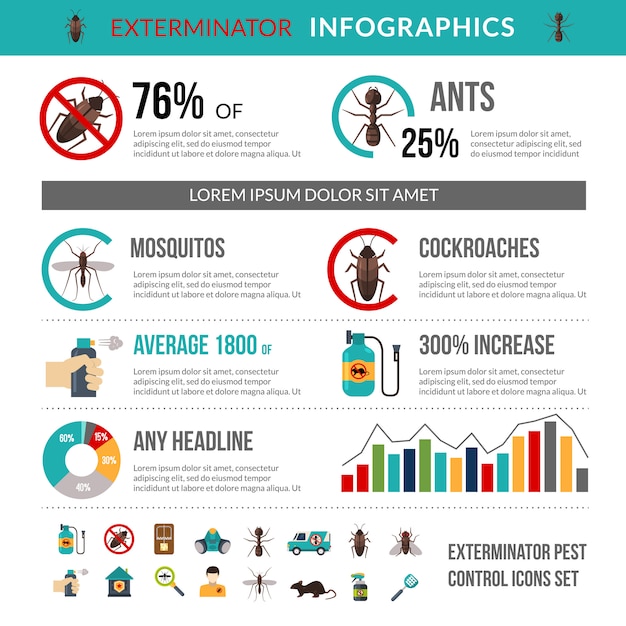Looking Into Advanced Approaches Used By Parasite Administration Professionals
Looking Into Advanced Approaches Used By Parasite Administration Professionals
Blog Article
Produced By- relevant internet site
Are you tired of relying entirely on sprays to deal with bugs in your home or office? While sprays can work, pest control specialists have created innovative strategies that go beyond just spraying chemicals.
These strategies not just offer more efficient and resilient options, but likewise focus on lessening making use of damaging pesticides. By checking out these innovative methods, you will find an entire new world of bug control approaches that are not only efficient, but also eco-friendly.
So, are you prepared to take your parasite control game to the next level?
Integrated Insect Management (IPM)
If you're trying to find an effective and environmentally-friendly technique to pest control, Integrated Parasite Management (IPM) is the option you require. IPM focuses on long-term avoidance and administration of pests, rather than just depending on pesticides. This approach considers the details needs and behaviors of insects, as well as the surrounding atmosphere.
By utilizing a combination of strategies such as biological control, habitat adjustment, and targeted pesticide use, IPM aims to decrease the reliance on chemical therapies and lessen harm to non-target organisms.
One crucial aspect of IPM is keeping track of and identifying parasites properly. This involves on a regular basis examining and evaluating the pest populace, in addition to identifying the particular varieties present. By understanding the biology and habits of pests, pest control experts can create targeted techniques to disrupt their life cycle and lower their numbers.
Another important element of IPM is making use of non-chemical control methods whenever feasible. This can include physical obstacles, such as mounting screens or sealing cracks and openings, to avoid pests from getting in structures. In addition, cultural techniques, like correct cleanliness and waste management, can aid eliminate bug food sources and reproducing grounds.
When bug control companies are necessary, IPM focuses on using them sensibly and as a last resource. This implies choosing the least hazardous and most effective alternative, applying it precisely and only to influenced areas, and following all safety and security guidelines. By minimizing pesticide usage, IPM reduces the possible dangers to human health and wellness and the atmosphere.
Biological Control
To better boost the efficiency of Integrated Parasite Monitoring (IPM), the next subtopic we'll check out is the technique of biological control. This strategy utilizes natural predators or bloodsuckers to control parasites.
Here are 4 key aspects of biological control:.
1. Intro of natural adversaries: In this method, valuable bugs or organisms are introduced to the area infested with parasites. These all-natural opponents take advantage of the pests, aiding to decrease their populace.
2. Conservation of natural adversaries: Rather than introducing new organisms, this method concentrates on producing an appropriate setting for existing useful insects. This can be accomplished via providing food, shelter, and water resources.
3. sugar ants removal : Right here, the variety of natural adversaries is enhanced unnaturally by reproducing and launching them into the plagued location. This aids to quickly minimize the pest populace.
4. Push-pull approach: This method integrates repellents and attractants to manipulate the actions of parasites. Repellents push insects far from crops, while attractants draw them in the direction of trap plants or areas where they can be quickly controlled.
Habitat Adjustment
Habitat adjustment plays a crucial role in pest control by changing the atmosphere to dissuade insect infestations. By making changes to the physical qualities of an area, you can create an unwelcoming environment for parasites, making it harder for them to make it through and prosper.
One common approach of habitat adjustment is removing or decreasing possible food sources for bugs. https://how-to-remove-snakes-from16161.blog-ezine.com/25880176/the-keys-of-bug-control-pros-unleash-the-power-of-advanced-strategies-and-bid-farewell-to-pesky-pests-for-good can consist of appropriate waste monitoring, sealing containers, and cleaning up food crumbs.
Furthermore, removing or decreasing locations of standing water can aid manage pests like insects.
Changing the landscape by cutting trees and bushes away from structures can additionally stop pests from accessing your home.
Verdict.
So there you have it - the innovative strategies utilized by pest control professionals go beyond just spraying chemicals. Integrated Bug Monitoring (IPM) integrates numerous approaches to successfully manage pests, while organic control utilizes all-natural adversaries to keep pest populaces in check.
Habitat adjustment likewise plays an important duty in stopping parasite infestations.
Did you know that according to a research study, executing IPM methods decreased chemical usage by an average of 71%? This not just protects our wellness and the setting but additionally conserves cash in the long run.
